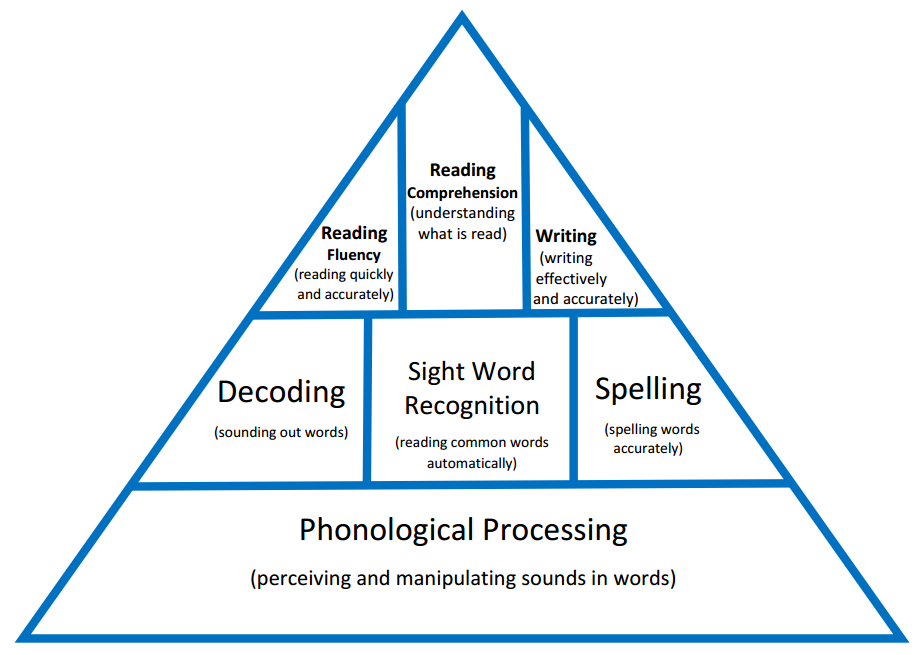- Early Reading Program
- Early Language Development
- Lindamood Phoneme and Sequencing (LiPS) Program for Reading, Spelling, and Speech
- Visualizing and Verbalizing Program for Language Comprehension and Thinking (VV)
- Written Expression
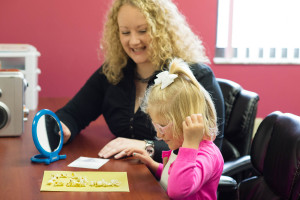 Early Reading Program
Early Reading Program
Kindergarten language arts curriculum is becoming increasingly challenging and complex. Students are asked to demonstrate a more solid understanding of sounds, letters and sight words than ever before. Unfortunately, students who have difficulty mastering these skills are at risk for falling behind their peers.
Therefore, Erin Huntington offers an early reading program that explicitly targets the underlying skills needed to develop strong reading and spelling abilities. The program incorporates multi-sensory techniques and play-based activities to optimize your child’s attention, interest and participation in the tasks.
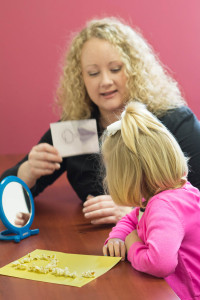 This program may be helpful for children who:
This program may be helpful for children who:
- Have been identified as having difficulty with language arts curriculum
- Have older siblings and/or parents who have had difficulty with language, reading and/or spelling
- Were identified as having speech or language delays as toddlers
- Have demonstrated signs and symptoms of learning difficulties
Please contact us for more information about the program and how to get started.
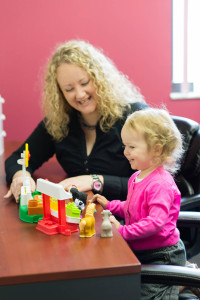 Early Language Development
Early Language Development
Children’s language skills, including both receptive and expressive language, begin to develop within the first couple of months following birth and continue to mature throughout their formative years.
- Receptive language skills refer to the ability to understand language and could include such abilities as smiling when being spoken to (birth – 3 months) or following multi-step directions (4 – 5 years).
- Expressive language skills refer to the ability to verbally express your thoughts and ideas completely. These skills range from making cooing sounds (birth – 3 months) to speaking in complete and mostly grammatically correct sentences in order to accurately tell a short story (4-5 years).
Language develops at variable rates for different children, although there are certain language milestones that should be achieved at certain ages.
If you have concerns about your child’s early language abilities, you might consider pursuing a full speech and language evaluation for your child in order to objectively assess his or her skills. If deficits are revealed, your child would likely benefit from therapy that explicitly and systematically addresses those deficits.
At Phoenix Comprehensive Care Group, Erin Huntington has extensive experience in developing a treatment plan with goals that effectively target your child’s language abilities so that he or she may develop to his or her potential.
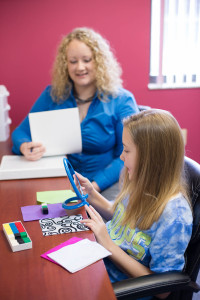
The Lindamood Phoneme and Sequencing (LiPS) Program for Reading, Spelling, and Speech ®
The LiPS program is used to treat reading and spelling deficits. It is used effectively with children, adolescents or adults. The LiPS program is different from other reading programs because it targets the very earliest skills needed to develop reading and spelling skills.
Many other reading programs start at the letter level, teaching students the letters and letter sounds. However, many students have difficulties at an earlier level- perceiving and making the speech sounds themselves. As a result, when starting at the letter level, they appear to be guessing or memorizing sounds or letters, rather than having a true understanding of the relationship between sounds and letters.
The LiPS program helps students develop a solid foundation at the earliest developmental level- the speech sound level. They develop a solid understanding of how to perceive and produce speech sounds using multi-sensory feedback. This allows students to develop a strong foundation for implicitly understanding each sound and its corresponding letter, thus paving the way for learning how to read and spell efficiently.
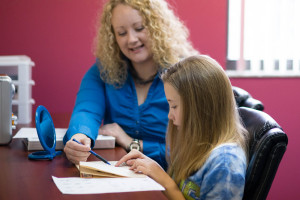 After developing a solid foundation at the individual sound level, students will move through a series of steps that teach them how to perceive, read and spell single syllable through multi-syllable words. It is common for students to gain years of reading and spelling skills and catch up to their grade-level curriculum in just a few months when taken through the LiPS program by a well-trained and experienced speech language pathologist. Erin has years of experience in implementing this program and has seen her students develop strong self-confidence with their newly developed reading and spelling skills.
After developing a solid foundation at the individual sound level, students will move through a series of steps that teach them how to perceive, read and spell single syllable through multi-syllable words. It is common for students to gain years of reading and spelling skills and catch up to their grade-level curriculum in just a few months when taken through the LiPS program by a well-trained and experienced speech language pathologist. Erin has years of experience in implementing this program and has seen her students develop strong self-confidence with their newly developed reading and spelling skills.
Visualizing and Verbalizing Program for Language Comprehension and Thinking (VV) ®
Students who have comprehension, memory or verbal expression difficulties may struggle with the following tasks:
- read a passage and answer comprehension question
- remember what they learned the previous day in order to continue learning the next day
- verbally communicate with their peers by participating in group activities
- demonstrate what they have learned by answering questions in either verbal or written formats
Deficits in any or all of these areas may lead to difficulty performing to a student’s potential and eventual frustration or avoidance with academic material.
Parents may notice some of these difficulties as they help their child with homework. Parents might notice that:
- their child appears to have a superficial understanding of the concepts
- their child seems to get lost in the details of a homework assignment and cannot grasp the main idea or big picture
- their child may need to spend an excessive amount of time finishing homework that should only take a few minutes
- their child seems to forget everything he or she worked on the night before and seems to have to start at “square 1” all over again the next night
- their child has difficulty communicating what happened in school or at their friends house in a clear and well-sequenced manner. Parents then may need to play the “20 questions game”, trying to piece together what their child is trying to say

These experiences are common with students who have comprehension, memory and/or verbal expression deficits. Parents or teachers may feel frustrated or uncertain with how to help the child “get it”.
Fortunately, these difficulties can be successfully remediated using an effective program delivered by a trained speech pathologist. At Phoenix Comprehensive Care Group, the primary program used to remediate these skills is the Visualizing and Verbalizing Program for Language Comprehension and Thinking (VV).
During this program, students discover how to use visual imagery to think about information they either hear or read. Students learn how to create a visual image in their minds that matches what they hear or read. It is common for students to feel more confident with answering comprehension questions and have more efficient studying or homework completion strategies at the end of this program. Parents may have to spend less time helping their child with homework, or may not even have to help at all. They may also notice their child become more clear and articulate when talking about their day so that parents do not have to ask questions or fill in the blanks in order to understand the story. Erin has years of experience in delivering this program and has seen her clients become more confident and effective with using their stronger language and memory skills.

Written Expression
Written expression encompasses a variety of writing skills. In order to write effectively in school, students must:
- identify and use correct grammar
- effectively use conventions (punctuation, spelling, capitalization)
- formulate complete sentences
- use creative and interesting words to express ideas
- write soundly constructed paragraphs and essays
Students may have difficulty in any or all of these areas and can stare at a blank piece of paper without knowing how to start writing. Parents may feel overwhelmed with how to help their child in this area.
In order to help her clients develop their writing skills, Erin will take them to the basics- learning how sentences are constructed. Clients will discover the building blocks of writing, including nouns, verbs, adjectives and adverbs.
After clients are able to correctly identify grammatical components of sentences, they will learn how to correctly combine these parts in order to formulate complete sentences. Additionally, clients will discover a variety of vocabulary words within each grammatical concept in order to develop a greater written expression vocabulary.
With a more solid understanding of grammar and a greater vocabulary from which to draw upon, students will learn how to brainstorm their ideas in an organized, sequential fashion in order to create an outline for a paragraph or essay. Finally, as students are able to create a more organized, complete paragraph or essay, they will learn how to edit their writing for important conventions such as capitalization, punctuation, run-on sentences, and subject-verb agreement.
Erin has years of experience delivering written expression treatment in order to help students improve their ability to get their thoughts and ideas onto paper. At Phoenix Comprehensive Care Group, written expression intervention can be offered in a one-on-one setting or in a group setting. Please contact us for more information on individual or group options.
Contact
Erin Huntington, MA, CCC-SLP
Phone (352) 812-3080
Email e.huntingtonslp@gmail.com


